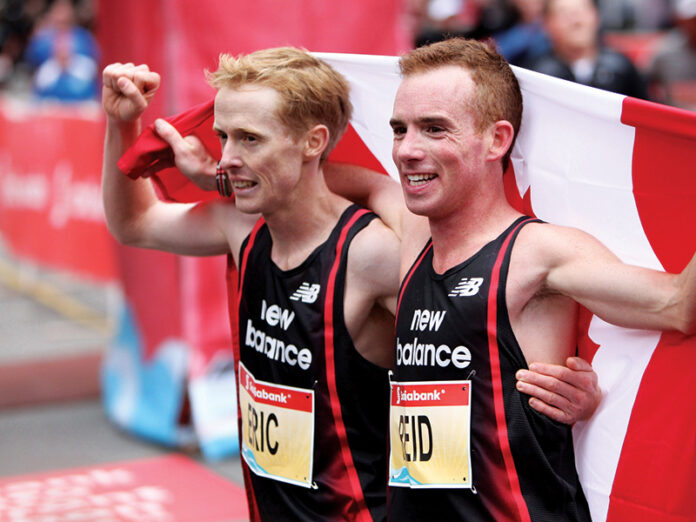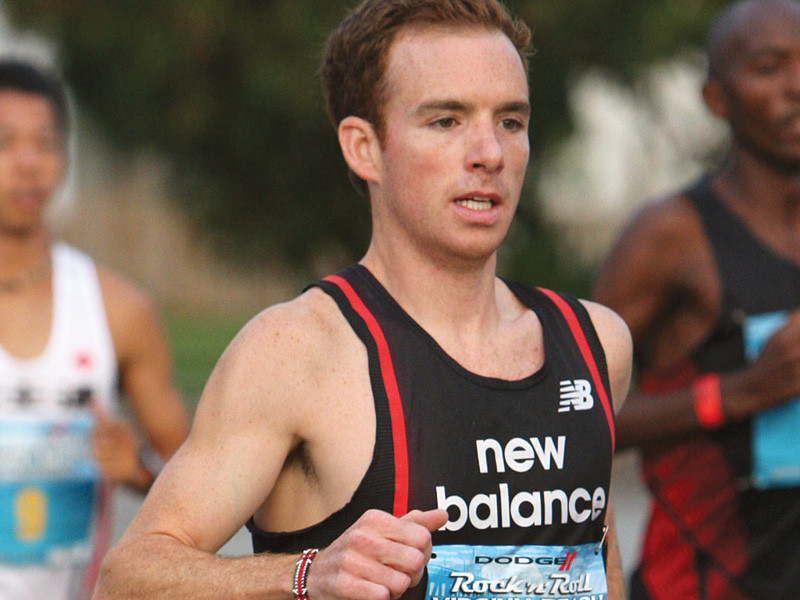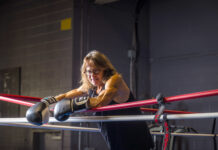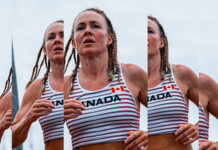
There’s a mythic image of a marathoner pounding pavement at 6 a.m., alone on a cold dark road, logging endless solitary kilometres, building base, teaching the heart and lungs to deliver energy to spring-loaded legs.
Reid Coolsaet and Eric Gillis, Canada’s dynamic duo of the marathon, don’t fit that image. Sure, they’ve done lots of solo runs, but there have been many two-a-day training sessions when they partner up, taking turns pacing, pushing each other to prepare to run their fastest 42.2K. Best friends, training partners and athletic equals, they have helped raise each other and Canada’s stature in the distance running world since teaming up 13 years ago at the Speed River Track and Field Club in Guelph, Ont.
The third man in the equation is Speed River founder and University of Guelph head coach Dave Scott-Thomas. He’s spent years defining and refining training programs for dozens of Canada’s best middle- and long-distance runners. Many of those mornings, Scott-Thomas
is out on course, placing nutrition bottles for his charges, watching his athletes’ strides and listening for the sound of their footfalls on pavement as they follow his running prescriptions.
“We’ve always approached it as a team,” says Scott-Thomas. “I think the loneliness of the long distance runner is B.S. There’s a joy, sometimes, in getting out running by yourself — I get that. The fact is most people are social and want to feel part of something bigger than they are — but the primary motivation is not external rewards, it is relational.”
Coolsaet and Gillis were among three Canadian men’s marathoners at the 2012 Summer Games in London —the other being Kingston’s Dylan Wykes. It was the first time in a dozen years that Canada qualified any man for the Olympic marathon. All three finished inside the top-27 of the 105-racer field.
“When I first started coming to Guelph in 2002, Reid was pretty committed to running. I wanted to do that, too, to learn from the people here,” says Gillis, a 35 year-old Nova Scotian. “Reid was one of the best to learn from. Now, we get faster by helping each other out. We’ve matched up well.”
Coolsaet, a native of Hamilton who is eight months older than his running partner, has been coached by Scott-Thomas since 1998. They invited Gillis to join Speed River after meeting at an event in Spain in 2002 and they have been together ever since. Coolsaet set his PB at the Toronto Waterfront Marathon in 2011, running 2:10.55. Gillis was 33 seconds behind in that race when he qualified for the Olympics by a hair.
As Coolsaet digested his time, he turned his attention to Gillis rounding the corner for the stretch run home. With the P.A. announcer and the crowd marking the time to an Olympic berth with a countdown from 10, Gillis made the Games standard by one second, clocking 2:11.28.
“I was more pumped about Eric’s race than mine,” says Coolsaet. “He had to try to get the Olympic standard. It was so close . . . I was going for the Canadian record and didn’t do it, but Eric did exactly what he needed to do to reach the Olympics. It was amazing.”
They would get to compete on the world’s biggest sporting stage in the same race. Four years earlier, a painful back injury kept Coolsaet from joining Gillis in the 10,000 metres at the 2008 Beijing Olympics. Coolsaet progressed to marathons in 2009 and Gillis stepped up a year later.
“We’ve had a lot of time to help push each other. It’s been really beneficial,” says Coolsaet. “Some marathoners like to be on their own, be in control of their pace and not worry about what other people are doing. But there aren’t that many people running marathons at our level that we can train with. My first two marathons I did some training with Kenyans. When you have people to train with you take advantage of it.”
Both athletes feel they are in better shape than ever to run fast. Tender shins derailed plans for Gillis to join Coolsaet at the Rotterdam Marathon in April but the Nova Scotian’s sights are still set on lowering his 2:11.21 PB set last fall in Toronto. Both are also looking for times low enough to meet the Canadian qualifying standard (still to be set) for the Rio Games in 2016.
Coolsaet spent several weeks this winter training in Kenya. Gillis was home with his wife and children, training in a brutally cold Ontario winter. A typical week for both athletes sees them running anywhere from 170K to 220K.
At just 130 pounds, Gillis says focus on form and alignment has done much to make him a better and very efficient runner. Since becoming a father, his attitude has changed, too. Family is right up there at the top of his priority list and he says it is helping his running.
“I’ve been able to bring everything into balance,” says Gillis, who scoffed when his wife, Emily, brought home a running stroller. “I thought ‘I’m a runner, I can’t push that,’ but I had the wrong mindset.”

Photo: Dean Palmer
He made an afternoon run with his daughter Heidi, 4, or son Luke, 1, part of his routine. “Lo and behold, I enjoyed it. I’m definitely as well-rounded and happy as I’ve ever been.”
Both athletes credit Scott-Thomas for their progression in running, trusting the programs he develops and marvelling at the work ethic their coach displays.
“A lot of people who run can relate to what these guys do — the discipline that’s needed to get out the door when you’ve been sitting in the office all day. There’s a direct relationship between that kind of discipline and motivation and what these guys do,” says Scott-Thomas. “Most people have something that hums inside that pushes them to be awesome.
“They might put themselves inthe hurt box a little longer, but it’s not just having the talent, if you want to be world class, you have to be very tough emotionally.”
Both athletes train full-time and, because they are not ranked top-16 in the world, neither qualifies for Sport Canada funding. Sponsorship from New Balance, CEP, 7 Systems Nutrition, Power Bar and a bit of prize money helps pay the rent. With the likes of Meb Keflezighi winning the Boston Marathon last year at age 38, and Bernard Legat still winning world championship medals at age 40, Coolsaet is confident his best is yet to come.
“I’ve learned that I can accomplish a lot more than I set out to. If you work hard and believe in yourself you can get to levels that at first don’t seem possible. That can transfer to other facets of life,” says Coolsaet. “I don’t think I’m some big talent, but running would never happen for me without hard work and consistent training.”
So Coolsaet and Gillis press on, keeping their eyes on fast tracks for low times. Neither plan to compete in Toronto at the Pan American Games this summer, but there is a chance they will return to the Scotiabank Toronto Waterfront Marathon in the fall. What’s certain is they will be doing a lot training together and socializing.
Scott-Thomas says he couldn’t be more proud of his boys, athletes who he has seen grow from college kids to world class athletes, men who show up on his doorstep with gifts and as much positive energy as they put into their sport.
“I’d run through fire for those guys,” says Scott-Thomas. “As long as they want to keep busting it and going hard and they think I can help, I’m their guy.”

Reid Coolsaet
Born: July 29, 1979, Hamilton, Ont.
Marathon Progression
Date Place Time
- Aug. 22, 2009 Berlin 2:16:53
- Sept. 26, 2010 Toronto 2:11:23
- Oct. 16, 2011 Toronto 2:10:55
- Aug. 12, 2012 London 2:16:29
- Dec. 1, 2013 Fukuoka 2:11:24
- Apr. 13, 2014 London 2:13:40
Personal Best Outdoor
Date Event Time
- Jul. 22, 2006 1,500 M 3:43.72
- Mar. 9, 2006 2,000 M 5:09.77
- Aug. 22, 2006 3,000 M 7:57.57
- Jul. 28, 2007 5,000 M 13:21.53
- Apr. 29, 2007 10,000 M 27:56.92
- Mar. 8, 2008 15 K 44:25
- Oct. 16 2011 Marathon 2:10:55

Eric Gillis
Born: March 8, 1980, Antigonish, N.S.
Marathon Progression
Date Place Time
- Oct. 19, 2014 Toronto 2:11:21
- Oct. 20, 2013 Toronto 2:11:4
- Aug. 12, 2012 London 2:16:00
- Oct. 16, 2011 Toronto 2:11:28
- Sept. 26, 2010 Toronto 2:12:08
Personal Best Outdoor
Date Event Time
- Jul. 21, 2007 5000 M 13:36.03
- May 4, 2008 10,000 M 28:07.19
- Oct. 19, 2014 Marathon 2:11:21















